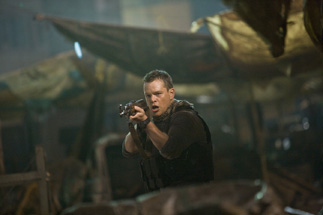Movie Review: Green Zone
By Matthew Huntley
March 18, 2010
BoxOfficeProphets.com

As the war nears its seventh anniversary (I know, I can't believe it either), there is still no evidence to suggest there were ever weapons of mass destruction in Iraq. You'll recall this was one of the Bush administration's primary justifications for invading Baghdad. The false intelligence provided to the U.S. military cost thousands of soldiers their lives and we, meaning the American people and the world, are still without an admittance of guilt or wrongdoing. Green Zone wants to reinforce, rather blatantly, the notion we were duped by Washington. Most of us know this going into the movie. So the question remains, what do we know coming out? Not much, I'm afraid.
Despite its fictional characters and situations, the movie draws itself from truth (Brian Helgeland's screenplay is loosely based on Rajiv Chandrasekaran's non-fiction book, Imperial Life in the Emerald City). The movie has noble intentions and takes itself seriously, but I can't help but think it inadvertently trivializes what it sets out to do by turning a somber war situation into a conventional action thriller.
The director is Paul Greengrass, who helmed United 93 and the latter two Bourne films. The man knows how to make movies and, deep down, I believe Greengrass thought he was making a bold and relevant statement, but how can we expect to take the movie as seriously as it takes itself when it combines brutally realistic war footage with an indestructible hero who maneuvers like, well, Jason Bourne? At one point, it's showing us disturbing imagery of a U.S. helicopter crashing down, which looks all too real, followed then by the hero performing magnificent stunts when it's most convenient for the plot. The movie wants to be two different things, but it doesn't quite know how to make that happen. I'm not sure it's possible.
Matt Damon, passionate and convincing in the lead role, plays Chief Warrant Office Roy Miller, whose military unit has been unsuccessful in locating any WMDs on their past three missions. After strike three, Miller starts to question the validity of the intel reports. His suspicions are all but confirmed when a CIA agent named Martin Brown (Brendan Gleeson) tells him he's wasting his time, despite what Miller's superiors say.
At the next potential site, an Iraqi man who calls himself Freddie (Khalid Abdalla) tells Miller he witnessed a meeting taking place with General Al-Rawi (Yigal Naor), who's nicknamed the "Jack of Clubs" and said to be one of Saddam Hussein's top aids. Miller entertains Freddie's claim and starts to uncover a link between Al-Rawi and a Washington puppet named Clark Poundstone (Greg Kinnear). Evidence begins to surface that the notion of WMDs was manufactured to make a cause for war. With Miller's help, this is the kind of story a Washington Post journalist (Amy Ryan) is seeking to uncover.
It's fairly certain most people going to see Green Zone will already be aware of its arguments, and that most will already believe and agree with them. But if that's the case, what real purpose does the movie serve other than preaching to the choir? Perhaps that's why it's also dressed up as a Hollywood action thriller - to disguise the fact its story is outdated and offer another reason for its existence. And, as a Hollywood action thriller, it's intense and fully equipped with the usual stunts, chases and violence, but most of it we've seen before.
I think the movie wants to condemn the war more than anything else, but its political stance is so outspoken that it fails to notice it's not telling us anything new or compelling. Even though most of us agree with what it has to say, it's no longer necessary to say it so extravagantly. Had the movie come out in 2004 or 2005, I would have said everyone needs to see it. In 2010, it's a victim of bad timing.